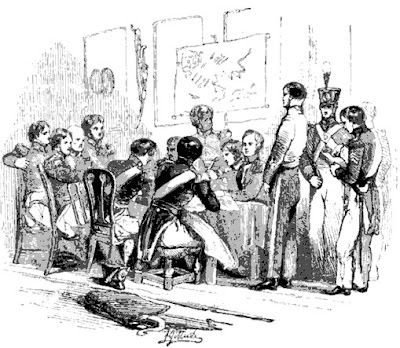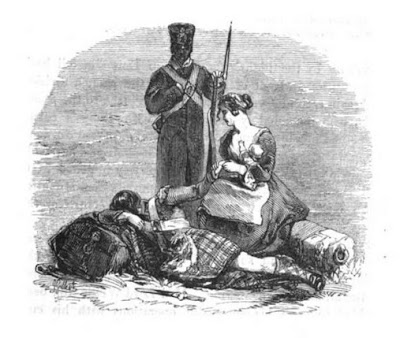 |
| The Battle of Waterloo from Historic, military and naval anecdotes of particular incidents by E Orme & illustrated by JA Atkinson (1819) |
On Friday 16 June 1815, the city of Brussels listened in fear and awe to the sound of distant cannon fire. The British and their allies had marched from the city in the early hours to face the advancing French under Napoleon.
All day rumours and reports from the nearby battlefields reached the increasingly nervous inhabitants, who feared that a French victory would see their city sacked by the French. Few went to bed easily that Friday night.
An anonymous observer of events in the city later published an account of their experiences, offering us a vivid insight into what is was like for a civilian during the three days of the Waterloo campaign.
 |
| Napoleon from The Life of Field-Marshal His Grace the Duke of Wellington by WH Maxwell (1852) |
Day 2: Saturday 17 June 1815
Not long after midnight, the population of Brussels, mainly Belgian but swollen by the many British who accompanied the army, was disturbed once more. This time it was by “the rolling of heavy carriages, in long succession, passing rapidly through the Place Royale.”1
Rising to enquire what was happening, the ‘near observer’ who recorded an account met a panic-stricken chambermaid, who insisted that the French were within half an hour of taking the city. “At the bottom of the stairs, a group of the affrighted Belgians were assembled - consternation pictured on their faces.”
The alarm subsided, for now, when they realised the wagons were artillery heading towards, not away, from the battlefields to the south of the city. But fresh panic swept in at 6am when Belgian cavalry galloped through the streets “at full speed, as if the enemy were at their heels.”1
The doors of all the bed-rooms open - the people flew out with their night-caps on, scarcely half dressed and looking quite distracted, running about pale and trembling.1
 |
| Retreat from Waterloo by J Gilbert engraved by AW Warren from The Life of Field-Marshal His Grace the Duke of Wellington by WH Maxwell (1852) |
Flight from the fight
The nervous made hasty preparations to flee.
In the court-yard below, a scene of the most dreadful confusion ensued; the scuffle that took place to get at the horses and carriages it was impossible to describe; the squabbling of masters and servants, ostlers, chambermaids, coachmen and gentlemen.1
Yet again, this disorder was followed by news, from an aide-de-camp of the Duke of Wellington, that the British army was in good order and more fighting was to be expected.
 |
| Illustration from The Life of Field-Marshal His Grace the Duke of Wellington by WH Maxwell (1852) |
The grim reality of war soon became evident on the streets, as wagons filled with injured troops began to arrive, along with the bodies of those who had died during the journey.
Numbers of wounded who were able to walk, were wandering upon every road; their blood-stained clothes and pale haggard countenances looking most dreadful.1
These terrible sights were accompanied by accurate reports that Wellington had retreated towards Brussels, as part of a tactical game of cat and mouse with the enemy. But
...nobody could convince the Belgians that a retreat and a flight were not one and the same thing; and firmly convinced that the English had been defeated, they fully expected every moment to see them enter Brussels in the utmost confusion, with the French after them.1
The sense of panic intensified on what must have been a sultry afternoon. “Every hour only served to add to the dismay.” The fearful were offering huge sums of money for a horse on which to escape the city, and many left on foot or in canal boats.
The weather broke later that day, with a “violent thunderstorm”. As night fell, the frightened city and the armies in the field were lashed by “torrents of rain”.
 |
| Illustration from The Life of Field-Marshal His Grace the Duke of Wellington by WH Maxwell (1852) |
A summary of the events on Saturday 17 June
After the battles of Friday, the French and British armies spent Saturday positioning themselves for another fight the following day. The heavy rain that soaked the ground at Waterloo, making movement difficult, is considered to be one of the factors turning the final battle in favour of the British.
Read about the Battle of Waterloo in the final post of the series.
Read about the Battle of Waterloo in the final post of the series.
Rachel Knowles writes clean/Christian Regency era romance and historical non-fiction. She has been sharing her research on this blog since 2011. Rachel lives in the beautiful Georgian seaside town of Weymouth, Dorset, on the south coast of England, with her husband, Andrew, who wrote this post.
Find out more about Rachel's books and sign up for her newsletter here.If you have enjoyed this blog and want to encourage me and help me to keep making my research freely available, please buy me a virtual cup of coffee by clicking the button below.
Note
(1) All quotes from The Battle of Waterloo by a near observer (1815).
Sources used include:
Booth, J (publisher), The Battle of Waterloo by a near observer (1815)
Maxwell, William Hamilton, Life of Field-Marshal His Grace the Duke of Wellington in three volumes (1852)


No comments:
New comments are not allowed.